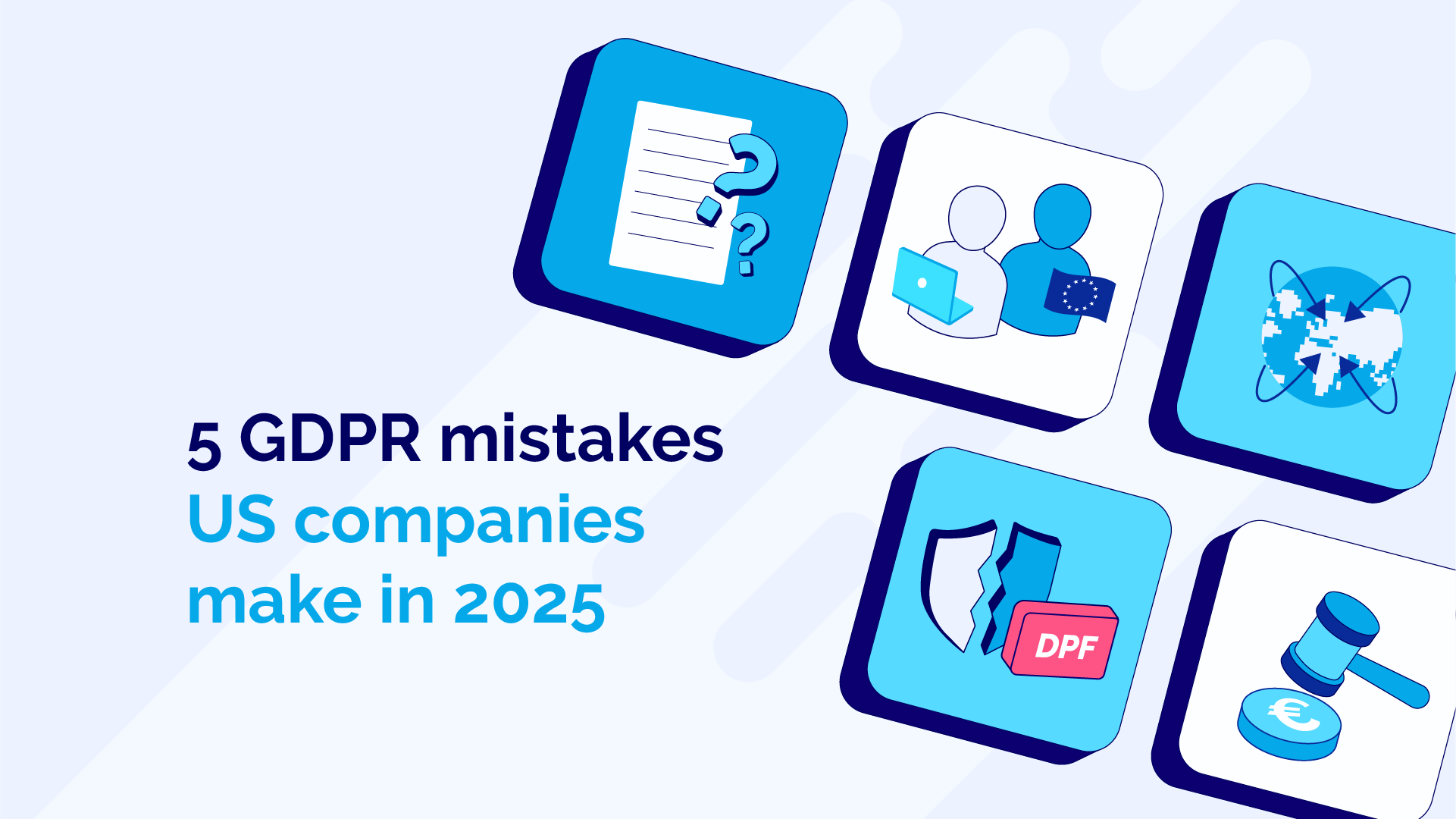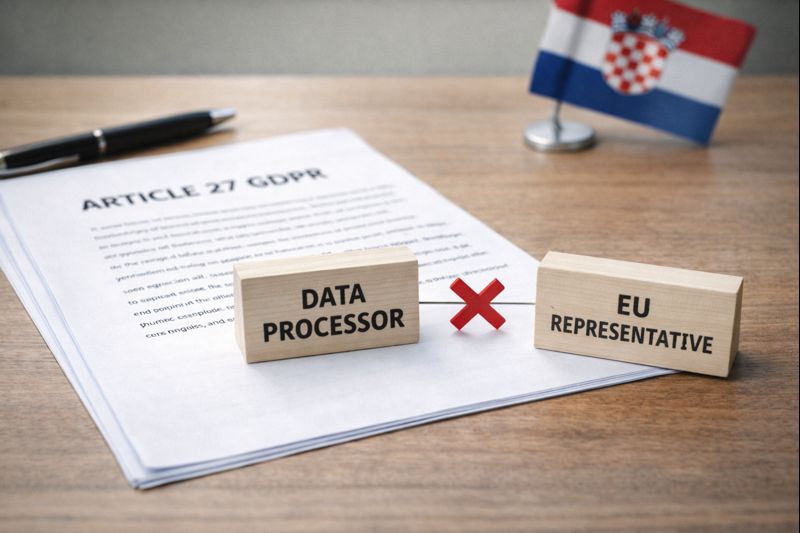5 GDPR mistakes US companies make in 2025 – and how to avoid them

The General Data Protection Regulation (GDPR) continues to apply to many US companies in 2025, even if they do not have a physical presence in the European Union. Despite years of guidance and enforcement, the same misunderstandings keep reappearing. Here are five of the most common GDPR mistakes US companies make — and how to avoid them.
Mistake 1 – Confusing the Data Protection Officer (DPO) with the EU GDPR Representative
An EU GDPR Representative is a local contact point for data protection authorities and individuals in the EU. Non-EU companies that are subject to the GDPR must appoint a representative to ensure smooth communication and compliance.
A Data Protection Officer (DPO) is responsible for overseeing a company’s internal data protection strategy and ensuring compliance with the GDPR. The DPO monitors data processing, conducts audits, and trains staff.
The DPO works inside the organisation, while the GDPR Representative is based in the EU and acts as an external contact point. Many US companies confuse the two roles, but under the GDPR, they are separate obligations and sometimes both are required.
Mistake 2 – Misunderstanding the extraterritorial scope of the GDPR
The GDPR applies to non-EU companies if they offer goods or services to individuals in the EU or monitor their behaviour online. This applies regardless of where the company is located.
Selling products to EU customers, operating an EU-facing website in EU languages, accepting payments in euros, or tracking EU visitors with cookies or analytics tools can all trigger GDPR obligations.
Mistake 3 – Incorrectly relying on the Privacy Shield (now EU-US Data Privacy Framework)
The Privacy Shield was an agreement that allowed certified US companies to transfer personal data from the EU to the US. In 2020, it was invalidated by the Court of Justice of the European Union in the Schrems II decision.
In 2023, the EU-US Data Privacy Framework (DPF) replaced the Privacy Shield. While participation in the DPF can help facilitate transatlantic data transfers, it does not exempt companies from GDPR compliance.
US companies must ensure that data transfers are lawful under the GDPR. This may involve joining the DPF, using Standard Contractual Clauses (SCCs), or implementing other approved safeguards.
Mistake 4 – Incomplete or unclear privacy policies
The GDPR requires privacy policies to be clear, accessible and transparent. They must explain what personal data is collected, how it is used, the legal basis for processing, and the rights of data subjects.
Many US companies omit details such as data retention periods, contact information for the EU Representative, or instructions on how to exercise data subject rights.
Mistake 5 – Underestimating GDPR fines and enforcement
Data protection authorities have issued fines to companies of all sizes, including non-EU businesses. In 2025, penalties for non-compliance remain high — up to €20 million or 4% of annual global turnover, whichever is higher.
Regular compliance reviews Data Protection Impact Assessments (DPIAs), staff training, and appointing an EU GDPR Representative can help mitigate risks.
How EDPO can help your business stay GDPR compliant
EDPO acts as your official EU GDPR Representative, ensuring compliance with Article 27 of the GDPR and facilitating communication with EU authorities.
For companies targeting the UK market, EDPO also offers UK GDPR Representative services to ensure compliance with the UK’s data protection regime.
COMMON GDPR MISTAKES
There’s a lot of information out there about what the GDPR is and how it operates.
Unfortunately, a lot of it is not correct. Mistakes about the GDPR still persist, and now that the Privacy Shield has been invalidated by the CJUE, there is even more confusion.
These GDPR mistakes and uncertainties can put many US companies in a situation where they could be facing fines of up to 4% of global turnover or 20 million euros.
EDPO enables US companies to continue to have access to the EU market by correcting these mistakes.

GDPR and US companies: Up close with a Privacy Shield official
On Tuesday 26 May, EDPO hosted an exclusive webinar on GDPR and US companies with a Privacy Shield official. Rochelle Osei-Tutu shared her...

Are your Data Processors fit to be EU Representative under Article 27 GDPR ?
Appoint your data processor as EU Representative and tick off article 27 GDPR? The Croatia Personal Data Protection Agency(“AZOP”) says no....

Brexit and the GDPR
Are you in one of these situations? I am a UK Company and I will need an EU Data Protection RepresentativeI am an EU Company and I will need...
Follow us on Linkedin for daily breaking GDPR news!
The General Data Protection Regulation (GDPR) continues to apply to many US companies in 2025, even if they do not have a physical presence in the European Union. Despite years of guidance and enforcement, the same misunderstandings keep reappearing. Here are five of the most common GDPR mistakes US companies make — and how to avoid them.
Mistake 1 – Confusing the Data Protection Officer (DPO) with the EU GDPR Representative
An EU GDPR Representative is a local contact point for data protection authorities and individuals in the EU. Non-EU companies that are subject to the GDPR must appoint a representative to ensure smooth communication and compliance.
A Data Protection Officer (DPO) is responsible for overseeing a company’s internal data protection strategy and ensuring compliance with the GDPR. The DPO monitors data processing, conducts audits, and trains staff.
The DPO works inside the organisation, while the GDPR Representative is based in the EU and acts as an external contact point. Many US companies confuse the two roles, but under the GDPR, they are separate obligations and sometimes both are required.
Mistake 2 – Misunderstanding the extraterritorial scope of the GDPR
The GDPR applies to non-EU companies if they offer goods or services to individuals in the EU or monitor their behaviour online. This applies regardless of where the company is located.
Selling products to EU customers, operating an EU-facing website in EU languages, accepting payments in euros, or tracking EU visitors with cookies or analytics tools can all trigger GDPR obligations.
Mistake 3 – Incorrectly relying on the Privacy Shield (now EU-US Data Privacy Framework)
The Privacy Shield was an agreement that allowed certified US companies to transfer personal data from the EU to the US. In 2020, it was invalidated by the Court of Justice of the European Union in the Schrems II decision.
In 2023, the EU-US Data Privacy Framework (DPF) replaced the Privacy Shield. While participation in the DPF can help facilitate transatlantic data transfers, it does not exempt companies from GDPR compliance.
US companies must ensure that data transfers are lawful under the GDPR. This may involve joining the DPF, using Standard Contractual Clauses (SCCs), or implementing other approved safeguards.
Mistake 4 – Incomplete or unclear privacy policies
The GDPR requires privacy policies to be clear, accessible and transparent. They must explain what personal data is collected, how it is used, the legal basis for processing, and the rights of data subjects.
Many US companies omit details such as data retention periods, contact information for the EU Representative, or instructions on how to exercise data subject rights.
Mistake 5 – Underestimating GDPR fines and enforcement
Data protection authorities have issued fines to companies of all sizes, including non-EU businesses. In 2025, penalties for non-compliance remain high — up to €20 million or 4% of annual global turnover, whichever is higher.
Regular compliance reviews Data Protection Impact Assessments (DPIAs), staff training, and appointing an EU GDPR Representative can help mitigate risks.
How EDPO can help your business stay GDPR compliant
EDPO acts as your official EU GDPR Representative, ensuring compliance with Article 27 of the GDPR and facilitating communication with EU authorities.
For companies targeting the UK market, EDPO also offers UK GDPR Representative services to ensure compliance with the UK’s data protection regime.





